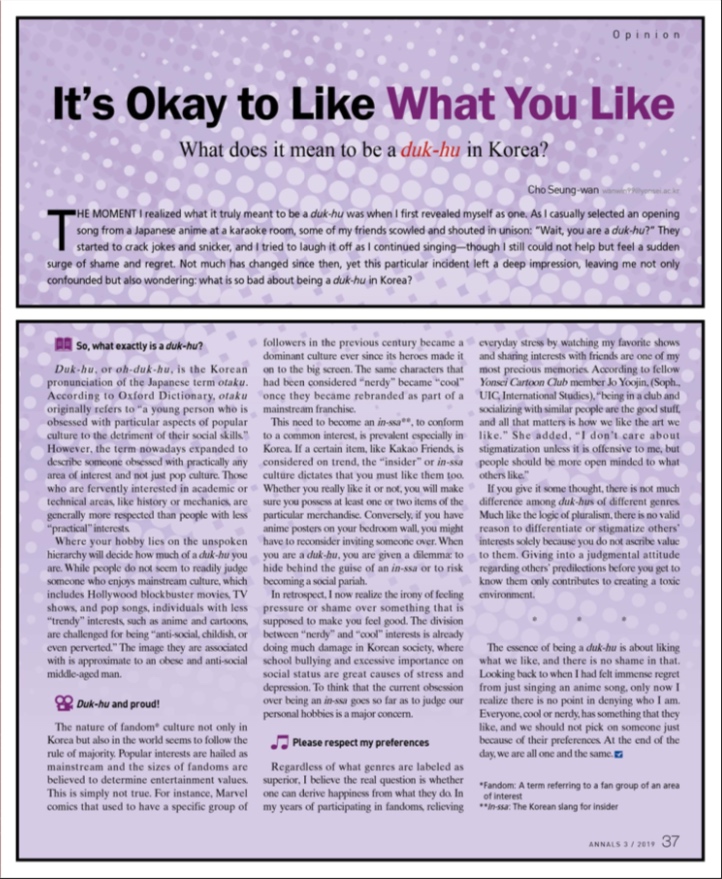What does it mean to be a duk-hu in Korea?

THE MOMENT I realized what it truly meant to be a duk-hu was when I first revealed myself as one. As I casually selected an opening song from a Japanese anime at a karaoke room, some of my friends scowled and shouted in unison: “Wait, you are a duk-hu?” They started to crack jokes and snicker, and I tried to laugh it off as I continued singing—though I still could not help but feel a sudden surge of shame and regret. Not much has changed since then, yet this particular incident left a deep impression, leaving me not only confounded but also wondering: what is so bad about being a duk-hu in Korea?
So, what exactly is a duk-hu?
Duk-hu, or oh-duk-hu, is the Korean pronunciation of the Japanese term otaku. According to Oxford Dictionary, otaku originally refers to “a young person who is obsessed with particular aspects of popular culture to the detriment of their social skills.” However, the term nowadays expanded to describe someone obsessed with practically any area of interest and not just pop culture. Those who are fervently interested in academic or technical areas, like history or mechanics, are generally more respected than people with less “practical” interests.
Where your hobby lies on the unspoken hierarchy will decide how much of a duk-hu you are. While people do not seem to readily judge someone who enjoys mainstream culture, which includes Hollywood blockbuster movies, TV shows, and pop songs, individuals with less “trendy” interests, such as anime and cartoons, are challenged for being “anti-social, childish, or even perverted.” The image they are associated with is approximate to an obese and anti-social middle-aged man.
Duk-hu and proud!
The nature of fandom* culture not only in Korea but also the world seems to follow the rule of majority. Popular interests are hailed as mainstream and the size of a fandom are believed to determine entertainment value. This is simply not true. For instance, Marvel comics that used to have a specific group of followers in the previous century became a dominant culture ever since its heroes made it on to the big screen. The same characters that had been considered “nerdy” became “cool” once they became rebranded as part of a mainstream franchise.
This need to become an in-ssa**, to conform to a common interest, is prevalent especially in Korea. If a certain item, like Kakao Friends, is considered on trend, the “insider” or in-ssa culture dictates that you must like them too. Whether you really like it or not, you will make sure you possess at least one or two items of the particular merchandise. Conversely, if you have anime posters on your bedroom wall, you might have to reconsider inviting someone over. When you are a duk-hu, you are given a dilemma: to hide behind the guise of an in-ssa or to risk becoming a social pariah.
In retrospect, I now realize the irony of feeling pressure or shame over something that is supposed to make you feel good. The division between “nerdy” and “cool” interests is already doing much damage in Korean society, where school bullying and excessive importance on social status are great causes of stress and depression. To think that the current obsession over being an in-ssa goes so far as to judge our personal hobbies is a major concern.
Please respect my preferences
Regardless of what genres are labeled as superior, I believe the real question is whether one can derive happiness from what they do. In my years of participating in fandoms, relieving everyday stress by watching my favorite shows and sharing interests with friends are one of my most precious memories. According to fellow Yonsei Cartoon Club member Jo Yoojin, (Soph., UIC, International Studies), “being in a club and socializing with similar people are the good stuff, and all that matters is how we like the art we like.” She added, “I don’t care about stigmatization unless it is offensive to me, but people should be more open minded to what others like.”
If you give it some thought, there is not much difference among duk-hus of different genres. Much like the logic of pluralism, there is no valid reason to differentiate or stigmatize others’ interests solely because you do not ascribe value to them. Giving into a judgmental attitude regarding others’ predilections before you get to know them only contributes to creating a toxic environment.
* * *
The essence of being a duk-hu is about liking what we like, and there is no shame in that. Looking back to when I had felt immense regret from just singing an anime song, only now I realize there is no point in denying who I am. Everyone, cool or nerdy, has something that they like, and we should not pick on someone just because of their preferences. At the end of the day, we are all one and the same.
*Fandom: A term referring to a fan group of an area of interest
**In-ssa: The Korean slang for insider
Cho Seung-wan
wanwin99@yonsei.ac.kr

